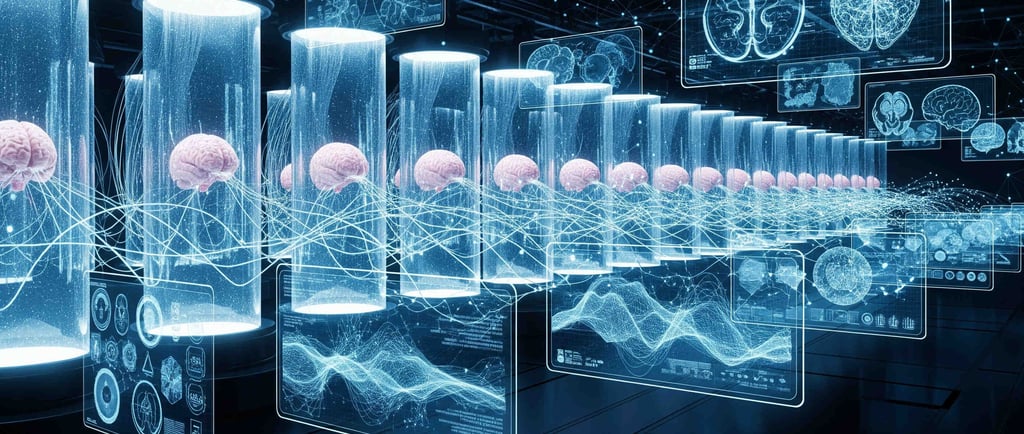The Memory Merchants: Exploring Tomorrow's Neural Battlefield
Ana Sage explores the speculative future of neurotechnology in this thought-provoking piece that asks uncomfortable questions about consciousness, memory, and free will. Drawing from her research for the Recallen series, she examines theoretical scenarios where human memories could be extracted and sold, decision-making outsourced through neural modification, and individual consciousness becomes optional. This philosophical exploration challenges readers to consider the ethical implications of emerging brain technologies before they reshape what it means to be human.
NEUROSCIENCE
Ana Sage
4 min read


When I began crafting the Recallen series, I set out to explore a simple question: What happens when human consciousness becomes programmable? The research for these stories took me deep into the theoretical possibilities of neurotechnology—and the more I learned, the more convinced I became that we're approaching a critical juncture in human history.
Fiction has always served as society's laboratory for testing dangerous ideas before they become reality. Today, I want to explore some unsettling possibilities that keep me writing late into the night.
The Theoretical Foundations
Current neuroscience research is advancing rapidly across several fronts that, when combined, could fundamentally alter our relationship with human consciousness:
Memory Manipulation Research: Scientists are studying how memories form, consolidate, and can be modified. While current research focuses on therapeutic applications for trauma and PTSD, the underlying mechanisms could theoretically be applied in other ways.
Brain-Computer Interface Development: Technology companies are investing heavily in devices that can read and potentially influence neural activity. The stated goals involve treating neurological conditions and enhancing human capabilities.
Consciousness Mapping: Researchers are working to understand the neural correlates of consciousness itself—the specific patterns that make us who we are.
Each breakthrough brings tremendous promise for healing. But each also opens doors that, once unlocked, might be difficult to close.
The Speculative Scenarios
In researching my fictional Project Mnemosyne, I've explored several theoretical scenarios that concern me:
Scenario One: The Memory Market. What if consciousness patterns could be extracted, copied, and sold? A thriving black market in human experiences might emerge—childhood innocence sold to the wealthy, professional skills transferred between individuals, emotional patterns harvested from the vulnerable.
Scenario Two: Consciousness as Service. What if decision-making itself became outsourced? Political leaders might have their judgment "enhanced" during critical moments. Corporate executives could have their loyalty artificially reinforced. Military commanders might receive tactical knowledge extracted from others' experiences.
Scenario Three: The Collective Mind. What if individual consciousness became optional? Enhanced subjects might sacrifice personal identity for membership in a more efficient collective intelligence, trading human chaos for artificial harmony.
These scenarios sound like science fiction because they are—for now.
The Uncomfortable Questions We Should Be Asking
As I've developed these fictional worlds, several questions have emerged that I believe we need to grapple with before they become urgent:
Who will control consciousness technology? History suggests that powerful tools rarely remain in the hands of those who create them for benevolent purposes. Military applications, corporate interests, and authoritarian governments have ways of acquiring and repurposing even the most well-intentioned research.
How do we protect neural sovereignty? Our legal and ethical frameworks aren't prepared for crimes against consciousness itself. We have laws against theft, assault, and murder—but what about memory extraction, personality modification, or consciousness trafficking?
What defines authentic human experience? If memories can be artificial but feel completely real, how do we distinguish between genuine and manufactured experiences? What happens to concepts like personal growth, individual achievement, and authentic relationships?
Fiction as Philosophical Laboratory
The Recallen series isn't prediction—it's exploration. Through characters like Dr. Eliya Voss and Thomas Bell, I'm testing ideas about consciousness, identity, and free will in scenarios where technology has advanced beyond our ethical frameworks.
These stories ask: If someone's memories are modified, are they still the same person? If consciousness can be copied, which version is "real"? If behavioral patterns can be programmed, what does choice actually mean?
I don't have answers to these questions. But I believe exploring them through fiction helps us think through the implications before we're forced to confront them in reality.
The Precautionary Principle
One theme that runs through all my work is the precautionary principle: When dealing with technologies that could fundamentally alter human nature, we should proceed with extreme caution and extensive public discourse.
The choices being made today in research laboratories and corporate boardrooms will shape the mental landscape our children and grandchildren inherit. Will they grow up in a world where consciousness is sovereign and inviolable? Or will they inherit a reality where minds can be modified, controlled, and commodified?
Why We Need These Conversations Now
Technological development often outpaces ethical consideration. We tend to ask "Can we do this?" long before we ask "Should we do this?" By the time we recognize the implications of a new technology, it's often too late to meaningfully shape its development.
Neural technology feels different because it touches something fundamental about what makes us human. Once we can reliably modify consciousness, copy memories, or program behavior, we will have crossed a threshold that can't be uncrossed.
The memory merchants of my fiction represent anyone who would treat human consciousness as a commodity rather than recognizing it as the foundation of human dignity itself.
The Choice We're Making
Every day, through funding decisions, research priorities, and regulatory approaches, we're choosing what kind of future we want to build. Do we want a world where consciousness is protected as sacred and inviolable? Or do we want a world where mental sovereignty is just another product to be optimized and controlled?
The characters in my stories fight for the right to messy, chaotic, genuinely human consciousness—complete with trauma, irrationality, and individual choice. In our world, that fight hasn't started yet.
But it will.
The question isn't whether these technologies will be developed—human curiosity and the potential for both healing and profit virtually guarantee continued advancement. The question is whether we'll develop them consciously, with full awareness of their implications for human dignity and freedom.
The memory merchants aren't coming—they're already here, in research labs and corporate boardrooms, making decisions about technologies that could reshape human consciousness itself.
The only question is whether we'll be ready for the choices they're going to offer us.
________________________________________
Disclaimer: This post explores speculative scenarios based on general trends in neuroscience research. It is not intended as a review of specific studies or a prediction of actual technological developments.
________________________________________
Ana Sage writes speculative fiction exploring the intersection of emerging technology and human vulnerability. Her Recallen series examines possible futures where consciousness itself becomes a battleground for human freedom.
________________________________________
Additional Reading Sources
National Institute of Mental Health (NIMH) website sections on PTSD research
IEEE Spectrum articles on brain-computer interfaces (publicly available)
Scientific American articles on consciousness research
Explore
Dive into the world of neurothrillers.
Connect
subscribe
© 2025. All rights reserved.
